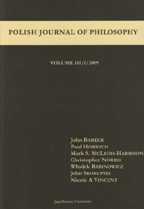Does Legal Interpretation Need Paul Grice? Reflections on Lepore and Stone’s Imagination and Convention
Does Legal Interpretation Need Paul Grice? Reflections on Lepore and Stone’s Imagination and Convention
Author(s): Marcin MatczakSubject(s): History of Philosophy, Philosophical Traditions, Special Branches of Philosophy
Published by: Instytut Filozofii Uniwersytetu Jagiellońskiego
Keywords: Paul Grice
Summary/Abstract: By significantly diminishing the role intentions play in communication, in Imagination and Convention (2015) Lepore and Stone attempt to overthrow the Gricean paradigm which prevails in the philosophy of language. The approach they propose is attractive to theorists of legal interpretations for many reasons. Primary among these is that the more general dispute in the philosophy of language between Griceans and nonGriceans mirrors the dispute between intentionalists and non-intentionalists in legal interpretation. The ideas proposed in Imagination and Convention naturally support the non-intentionalist camp, which makes them unique in the contemporary philosophy of language. In this paper I argue that despite an almost universal acceptance for the Gricean paradigm in legal interpretation, a strong, externalist approach to language, one in which interpretation is based on conventions, not intentions, better reflects the nature of legal language. The latter functions in societies as a written, public discourse to which many individuals contribute; the number of contributions renders the identification of individual intentions impossible, making it badly suited to a Gricean, intention-based analysis. Lepore and Stone’s discourse-based, non-Gricean alternative provides a better tool for the theorist of legal interpretation to analyse legal language. In what follows, I first present an overview of the disputes in legal interpretation that may be affected by Imagination and Convention. In the second section, I analyze several of Lepore and Stone’s theses and apply them to issues in legal interpretation, paying particular attention to their concept of “direct intentionalism.” In the last section, I outline some proposals for finishing the anti-Gricean revolution, which involves Ruth Millikan’s idea of conventions as lineages.
Journal: Polish Journal of Philosophy
- Issue Year: X/2016
- Issue No: 1
- Page Range: 67-87
- Page Count: 21
- Language: English
- Content File-PDF

